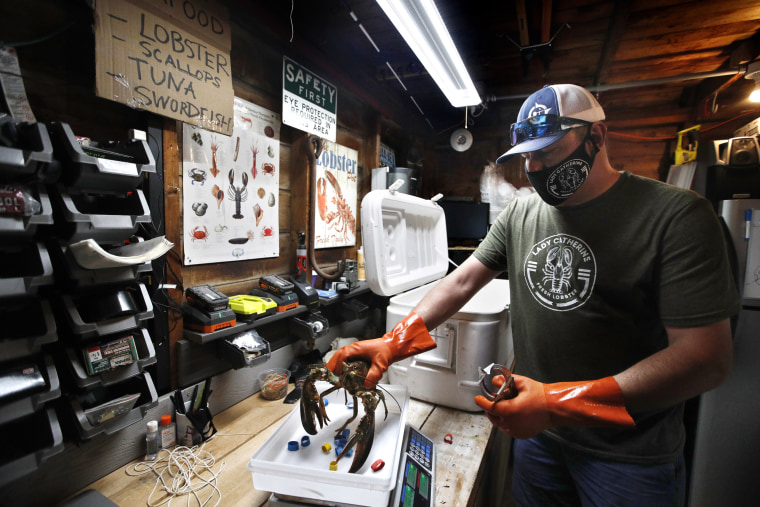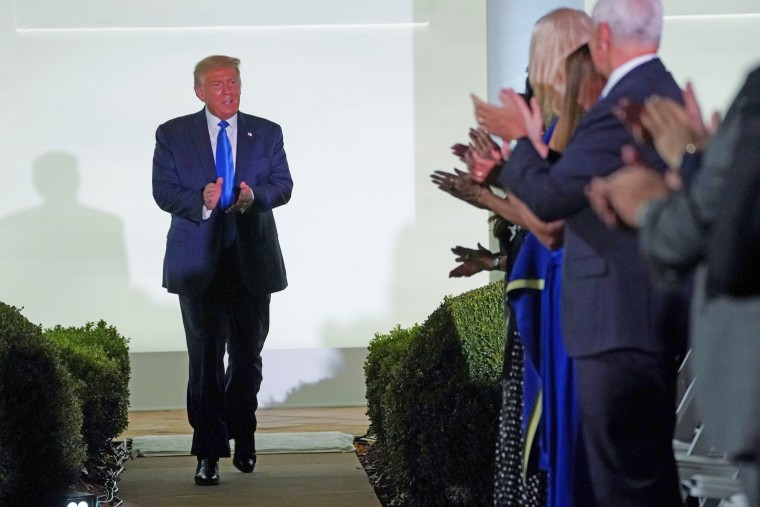On Tuesday night during the Republican National Convention President Donald Trump again touted his ability to get wins for iconic industries in specific states, but scrutiny reveals he’s failed to deliver. Many of Trump’s actions have not achieved their stated outcomes, or failed to materialize promised sales, jobs and growth, analysis shows.
“Beautiful Maine Lobsters will now move tariff-free to Europe!” the President tweeted on Tuesday, ahead of a speech that night by a Maine lobster fisherman.
The state was won by Hillary Clinton in 2016 by fewer than three percentage points and is now seen as “purple,” blue on the coast and red in the inland rural areas.
The lobsterman, Jason Joyce, praised the president that night. “He brokered a deal to end EU tariffs… on Maine lobster products, which is great news for Maine's lobstermen,” he said.

The American lobster industry exported $111 million worth of lobster to the E.U. in 2017, but more recently has been hurt by the retaliatory tariffs China placed on American lobster in 2018, which caused exports to crater by more than 80 percent.
Trump has also touted as evidence of his support for lobster fishermen the rollback of an Obama-area establishment of a protected marine area that closed the area to commercial fishing. An analysis found that only five lobster fishing permits would be impacted by the monument – less than 0.05% of the industry.
Tangible results may matter less to his base though than the appearance that Trump is fighting for their interests.
“Although Maine's lobstermen don't fish there, Obama's executive order offended us greatly,” said Joyce.
The economy-focused messages of the Republican National Convention highlighted the ways in which the White House has engaged in trade policies and regulatory rollbacks targeted to specific states deemed critical by Republicans in the 2020 Presidential election.
The RNC’s speaker slate on Tuesday included a speaker from the dairy industry in Wisconsin,
another state in which Trump is leaning heavily on his self-proclaimed deal-making prowess to hold onto his 2016 electoral gain.
Trump has touted his trade policies as being beneficial to the dairy industry, but the reality is less than it seems, according to trade economists.
The new United States-Mexico-Canada Agreement, the trade pact that took effect in June and replaced NAFTA, opened up 3.6 percent more of the American dairy industry’s access to the Canadian market.
Both the U.S. and Canada engage in complex protectionism, including tariffs and import quotas, to support their own respective dairy industries. Scholars at the Brookings Institution pointed out in a recent report that the 270 percent tariff Trump has railed against was never actually paid.
In recent months, American dairy farmers have been grappling with slumping demand as schools, hotels and restaurants shut down and consumer behavior shifted.
This is driving down prices which, when combined with supply chain bottlenecks brought on by the pandemic, has led to some farmers having to dump supplies of milk it would cost more to process than to discard.
Trump’s trade war with China also has hurt many of the other heartland states on whose support he relies. The White House pledged aid packages of $12 billion and $16 billion in 2018 and 2019, respectively, to support farmers whose exports collapsed when China imposed retaliatory tariffs.
A review by the Environmental Working Group found that very little of that assistance went to small farmers. The top 1 percent of aid recipients received an average of just over $183,000 each, while the bottom 80 percent got payouts that averaged less than $5,000 each.
A key element of the Phase One trade deal settled at the beginning of this year was the commitment by Beijing to buy $80 billion of agricultural products, including soybeans, grains, pork and seafood, but the Peterson Institute for International Economics found China falling far short of those commitments.
Tuesday night also featured the owner of a Wisconsin metal factory firm to illustrate his support for manufacturing jobs. Chinese electronics manufacturer Foxconn pledged to invest $10 billion in a Milwaukee-area manufacturing complex the President referred to as “the eighth wonder of the world” in 2018. Foxconn got $4 billion in tax breaks in exchange for a promise to create 13,000 new jobs.
Wisconsin is still waiting for those jobs, even as the manufacturing sector battles the one-two punch of the trade war and the coronavirus pandemic.
“Wisconsin has lost hundreds of manufacturing jobs the last five months due to his tariffs,” Wisconsin Assembly Minority Leader Gordon Hintz, a Democrat, told NBC News. “There is a major disconnect between what Trump says and what the reality is.”
Last week, as the Democratic candidate took the virtual stage for the Democratic National Convention, the President offered counter-programming by stumping in Joe Biden's home state of Pennsylvania.
The state is another key battleground, a state Trump flipped in 2016 by the slimmest of margins. He has touted his record on energy extraction to drum up voter support and claimed — misleadingly — that Joe Biden would devastate the state’s economy by curtailing energy production.
In a visit to the Pittsburgh area last year, Trump bragged about the development of a petrochemical plant that will bring 600 permanent jobs — although the division of Royal Dutch Shell building the plant actually already secured $1.7 billion in tax credits back in 2012.
